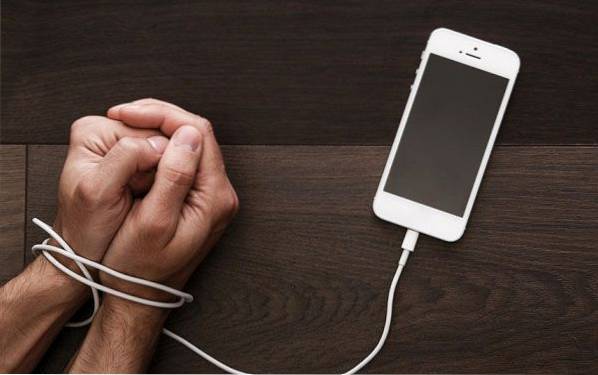
What is Nomophobia? The great fear of our times

Nomophobia is a term that describes the fear of being without a mobile device.
Contents
- Origin of the term Nomophobia
- Consequences of Nomophobia
- 1. Waste of time
- 2. Be more anxious
- 3. Less hours of sleep
- 4. Children learn from what they see.
- Signs of Nomophobia
- How to combat Nomophobia
- 1. Turn off your mobile phone at least one hour before going to bed
- 2. Do not use your mobile alarm clock
- 3. Set certain times to check your phone
- 4. Establish phone free zones
- 5. Participate in real human contact
Origin of the term Nomophobia
Nomophobia is everywhere today, although it is especially worrisome among young people who have already grown up with this culture of the personal smartphone. The term is an abbreviation for "no - mobilis" telephone and "phobia", which was coined during a study done by the UK Post Office in 2010. The Post Office commissioned the research company YouGov, the study of anxiety symptoms suffered by mobile phone users. The study showed that almost 53% of UK mobile phone users tend to be anxious when they "lose their mobile phone, run out of battery, credit or have no network coverage."
The study found that about 58% of men and 47% of women suffer from this type of phobia, and an additional 9% feel stressed when their mobile phones are turned off. The study was conducted on 2,163 people. 55% of respondents cited staying in touch with friends or family as the main reason for feeling anxiety when they couldn't use their mobile phones. Only 10% said that the cause was their work, since it required them to be permanently connected.
Consequences of Nomophobia
Although it may not seem like it at first, Nomophobia has serious consequences in our lives.
1. Waste of time
While many of us are convinced that multitasking allows us to do more things, the reality is that multitasking does not work. Our brains are not prepared to handle two or more different tasks at the same time, so that by trying to accomplish several at the same time, we end up making things worse and wasting more time instead of saving it..
2. Be more anxious
Not having our phone close by can considerably increase our anxiety levels. A British study showed that 51% of the population suffer from "extreme anxiety" when they are separated from their smartphones. Some of that stems from the feeling that if we're separated from our phones, they won't include us when friends make plans or they won't know what the latest Facebook, Twitter, or Instagram meme is..
Even our bodies are beginning to recognize when our phones are not there. A University of Missouri study found that iPhone users who were separated from their devices during situations that required a significant amount of attention, such as taking an exam or completing a work assignment, could lead to poorer performance. This was observed because, when participants were detached from their phones and then asked to complete simple word search problems, their heart rate and blood pressure increased, as did their feelings of anxiety..
3. Less hours of sleep
Checking email over and over again, making sure there are no friends posting something interesting, taking one last look at Instagram ... this and other things keep us going to sleep later and later..
We are being inundated at all hours by more and more immediate information, also just before going to bed. And most of us sleep with our phones close by. Apparently at least 40% of Americans sleep with their cell phones within reach. Between the ages of 25 and 29, the number is even higher: almost 80% of young people have their phone right next to them.
The danger is not only that the beeps or vibrations during the night can wake us up. Smartphones also emit a blue light when information reaches them, something that apparently signals to our brain that it is time to wake up. Blue lights suppress melatonin, the hormone that dictates our sleep rhythms.
4. Children learn from what they see.
"Do what I say, not what I do", this is very real when it comes to the time we spend with our mobile. Although adults ask children and adolescents to moderate their use of the phone, most can see how their parents do not.
It stands to reason then that, in almost all studies of smartphone use, young adults are the ones with the highest usage rates. Children are learning that being always connected is normal, and are neglecting the importance of person-to-person interaction..
Signs of Nomophobia
Here are some of the main symptoms of mobile addiction:
- You always look at your mobile when you wake up and before going to bed.
- It is not unusual for you to look at the latest messages or news while you are eating.
- When your phone is out of reach, has a low battery, or is completely off, you feel anxious or stressed.
- Being away from the phone makes you feel like something is missing.
- Have you checked your phone at least once while reading this article!
You can also take this mobile addiction test to check your results.

How to combat Nomophobia
1. Turn off your mobile phone at least one hour before going to bed
Give your brain a chance to relax, commit to turning off the phone an hour before bed. The vibrations and flashing lights are still harmful when we try to sleep, so do not keep the mobile near you during that last hour. Remember, if Nomophobia never sleeps and neither do you.
If you have a legitimate reason to keep your phone close at night, put it in "do not disturb" mode and place the phone across the room. In this mode, the phone will silence all notifications, but allow exceptions to be enabled, such as a phone call from a specific number.
Remember: looking at the number of “likes” on your latest Instagram post is not a legitimate reason..
2. Do not use your mobile alarm clock
Use a traditional alarm clock to wake you up in the morning. This will not only allow you to get away from your mobile during the night, but instead of waking up with the immediate temptation to see what you have missed during that time, you can spend the first moments of the morning stretching, thinking about what you are going to do during the day or just doing something other than checking your phone.
3. Set certain times to check your phone
Is it really essential to look at each email right at the moment it is received? Use common sense and at the same time help your productivity by designating certain times to take a look at your smartphone.
For example, you may want to take a look at your social media and email just before you start working, so do it right then and then leave the phone away until you can take a break..
Once you have finished the workday, take a certain period of time to check the mobile, and then leave the rest free. Perhaps after dinner (and well before bedtime) you can allow yourself 10 minutes to review messages that may have arrived or that require your attention..
Then be uncompromising: if it's not something that requires your attention right now, it can wait until tomorrow..
4. Establish phone free zones
Designating certain places and free phone hours is a great way to deal with Nomophobia..
Mealtimes are a good starting point: practice eating being more aware of what you are doing at the moment and having an interesting conversation with someone. It is also a unique opportunity to be a good example for children; they will discover the value of conversation and good food.
5. Participate in real human contact
Lastly, instead of "connecting" with friends and family through social media, try to spend some real time with them. Instead of liking your cousin's status, call him to hear the story firsthand. Go have a coffee with your friends to catch up on the news instead of using the WhatsApp group.
We are social animals that thrive on real human interaction. And that's something that a smartphone can't replicate.



Yet No Comments